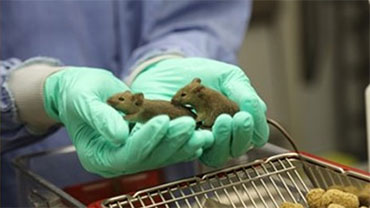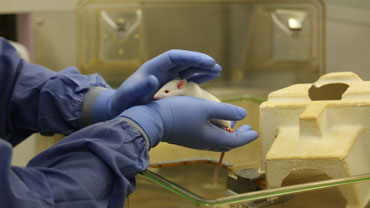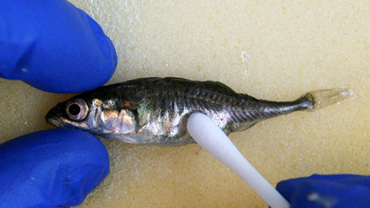Research Involving Animals – Division of Biomedical Services
2020 news
16 November 2020
Nicotine chronic tolerance development and withdrawal in the planaria (Schmidtea mediterranea)
Fatih Sal, Jose Prados, Gonzalo P. Urcelay
Nicotine addiction is a major preventable cause of death in humans and is characterized by multiple unsuccessful attempts to quit smoking cigarettes. The research group assessed the acute and chronic effects of nicotine on the motility of planarians. This is an excellent example of the replacement of the use of animals in biomedical research.
- Read the full article from ScienceDirect
23 October 2020
Skin swabbing is a refined technique to collect DNA from model fish species
Ceinwen A. Tilley, Hector Carreño Gutierrez, Marion Sebire, Oluwapelumi Obasaju, Florian Reichmann, Ioanna Katsiadaki, Iain Barber & William H. J. Norton
Model fish species are extensively used for biomedical research. The most popular technique to collect DNA from fish is fin clipping. Unfortunately however, this has the potential to cause harm to the animals. The research group investigated an alternative technique, skin swabbing, which causes fewer changes to stress axis activation and behaviour.
- Read the full article from Nature
22 September 2020
Complement Properdin Regulates the Metabolo-Inflammatory Response to a High Fat Diet
Rόisín C. Thomas, Ramiar Kheder, Hasanain Alaridhee, Naomi Martin and Cordula M. Stover
Complement Properdin Determines Disease Activity in MRL/lpr Mice” demonstrates the significant role of properdin in amplifying immune complex mediated complement activation, thereby worsening inflammation and causing renal damage. The study supports the concept that disease could be managed by blocking properdin.
- Read the article from Medicina
27 August 2020
Complement Properdin Determines Disease Activity in MRL/lpr Mice
Hasanain Alaridhee, Azzah Alharbi, Zeayd Saeed, Róisín C. Thomas and Cordula M. Stover
Complement Properdin Regulates the Metabolo-Inflammatory Response to a High Fat Diet” describes that the presence of and the activity mediated by properdin limits the effects of a Western style diet on development of fatty liver disease and obesity related kidney disease. The study supports the concept that complement as a whole is a factor to consider in the metabolic response to a high fat diet and we show that two receptors which are involved in fatty acid uptake, CD36 and C5L2, are involved in the development of disease in a properdin dependent way.
- Read the article from Medicina
10 August 2020
Age-dependent effects of protein restriction on dopamine release
Fabien Naneix, Kate Z. Peters, Andrew M.J. Young, James E. McCutcheon
Balanced protein intake is crucial for health and development. This work studied how having too little protein in diet when rats are adults or during their adolescence may affect their brain function. Using a recording technique called fast-scan cyclic voltammetry, researchers observed that low protein diets affected the release of dopamine, an essential neuromodulator for motivation and learning. Interestingly, the consequence of the low protein diet differed depending on the age of the rats and had stronger effects when performed in adolescent animals, highlighting the vulnerability of the brain to dietary deficiencies during development.
- Read the article from Neuropsychopharmacology
3 June 2020
 Kv3.1 and Kv3.3 subunits differentially contribute to Kv3 channels and action potential repolarization in principal neurons of the auditory brainstem
Kv3.1 and Kv3.3 subunits differentially contribute to Kv3 channels and action potential repolarization in principal neurons of the auditory brainstem
This research used CBA mice and transgenic knockout mice, which had been backcrossed here at Leicester onto the same CBA strain. The study used brain tissue from humanely killed mice to conduct in vitro studies of the mechanisms of hearing by using histology, electrophysiology and measurements of gene expression. The study compared the role of two genes and discovered that one of the genes (called kcnc3 or Kv3.3) is crucial for normal hearing (and other aspects of brain function). Research on this topic is continuing in the PRF to explore how mutations in Kv3.3 underlie hearing loss and neurodegeneration in diseases such as spinocerebellar ataxia type 13 (SCA13).
- Read the article from the Journal of Physiology
16 April 2020
 Inhibition of neuroinflammatory nitric oxide signalling supresses protein glycation and recovers neuronal dysfunction in prion disease
Inhibition of neuroinflammatory nitric oxide signalling supresses protein glycation and recovers neuronal dysfunction in prion disease
Studies carried out by researchers at the University of Leicester led by Joern Steinert's research group.
Inhibition of neuroinflammatory nitric oxide signalling supresses protein glycation and recovers neuronal dysfunction in prion disease. This study is associated with Alzheimer’s and Parkinson’s disease.
- Find out more from Research Square
